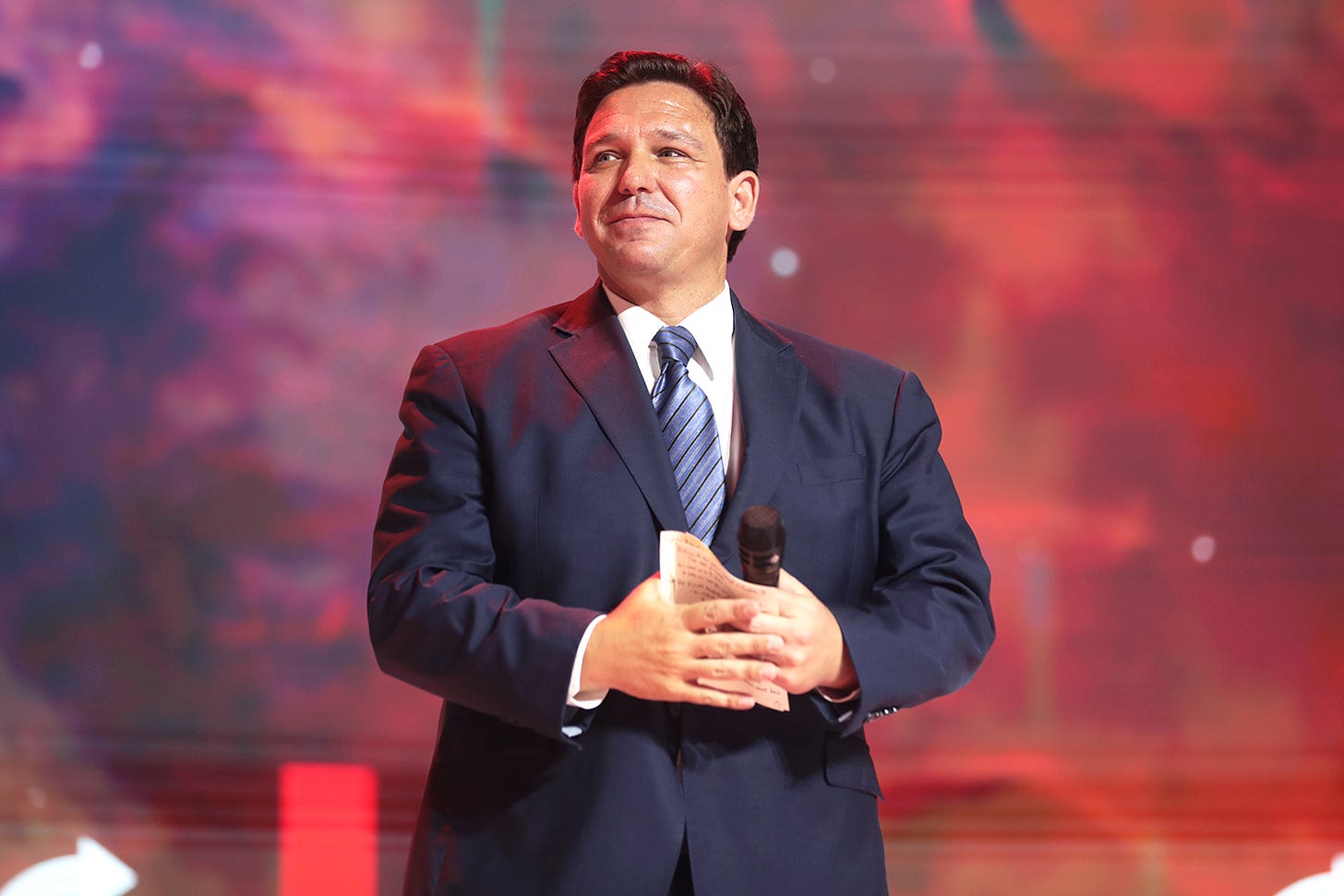Is Ron DeSantis the Next Donald Trump?
The Florida governor has become a strong contender for his party’s presidential nomination.

Florida governor Ron DeSantis has become former president Donald Trump’s most likely rival for the Republican Party’s presidential nomination in 2024.
DeSantis won reelection with almost 60 percent support on Tuesday, up from 50 percent in 2018 and by the widest margin in a Florida gubernatorial election in forty years.
Florida’s members of Congress benefited. Senator Marco Rubio was reelected with 58 percent support, up from 52 percent in 2016. Florida Republicans gained three seats in the House of Representatives.
Trump-backed candidates, on the other hand, lost all over the country.
So who is DeSantis? And why does his popularity alarm not only Trump, but progressives?
Worse than Trump?
Dexter Filkins of The New Yorker has described DeSantis as “Trump with a brain”. He reminds Washington Post columnist Max Boot of another disgraced former president: Richard Nixon. Zack Beauchamp of the left-wing opinion website Vox sees a similarity with Hungary’s Viktor Orbán.
Jonathan Chait argues in New York magazine that DeSantis would “kill democracy slowly and methodically.” MSNBC columnist Michael A. Cohen calls him “the most dangerous figure in American politics.” His colleague Dean Obeidallah argues there should be a “special place in hell — or potentially in prison” for DeSantis, who prohibited schools from mandating that students and teachers wear masks during the COVID-19 pandemic.
Worse from a free-market point-of-view, DeSantis also barred private employers from requiring COVID-19 vaccinations of their employees.
He threatened to fine the Special Olympics $27.5 million if it insisted on a vaccine mandate for athletes. The charity backed down and eliminated the requirement for their 2022 edition in Orlando.
DeSantis is thin-skinned
A comparison with the thin-skinned Nixon seems apt. DeSantis vetoed $35 million in state funding for the Tampa Bay baseball team after it called for gun control in a tweet. DeSantis opposes stricter gun laws.
The governor banned 54 math books he felt were “woke” and prohibited schools from teaching gender identity and sexual orientation to children under the age of 10 in ways that are not “age-appropriate” — without specifying what age-appropriate means. When Disney World, Florida’s largest employer, criticized the policy, DeSantis revoked the theme park’s self-government.
He also removed the (elected) state attorney of Tampa, who disagreed with him on abortion rights. After the Supreme Court overturned Roe v. Wade, the 1973 decision that legalized abortion nationwide, DeSantis banned abortion in Florida after fifteen weeks of pregnancy. (Which is similar to laws in Europe.)
He reined in local autonomy by:
Approving a penalty for localities that enact stricter gun laws than the state;
Banning so-called sanctuary cities, which don’t cooperate with federal immigration authorities, even though Florida didn’t have any;
Making it more difficult to cut local police funding;
Preventing counties from banning cruise-ship ports and petrol stations; and
Setting a thirty-day limit on processing building permits.
The last measure is good for business, though.
Not a conservative, not a Trump
“These actions are inconsistent with prior conservative conceptions of limited government, corporate autonomy and individual liberty,” writes conservative David French.
That doesn’t make him a Trump:
There is no evidence at all that Ron DeSantis would sooner destroy the republic than lose an election. There is no evidence that he shares Trump’s gross incompetence or his grotesque, habitual deceitfulness.
Andrew Sullivan, another conservative author, goes further: DeSantis may be the Republican Party’s best hope of preventing another Trump nomination.
What else has DeSantis done?
Sullivan sees something of Teddy Roosevelt in DeSantis. He budgeted $400 million for environmental projects that are meant to protect Florida from rising sea levels, $2.5 billion for the restoration of the Everglades, and he approved the Florida Wildlife Corridor, which will connect Florida’s national and state parks with tracts of open land to create an uninterrupted wildlife zone from the Alabama border to the south coast. (Unlike Trump, DeSantis does not deny climate change.)
In the wake of demonstrations against police brutality in 2020, in which statues were defiled and torn down, DeSantis made it a misdemeanor to damage memorials and a crime to publish people’s personal information online with an intent to harm.
In 2021, DeSantis banned transgender girls and women from competing in women’s sports.
In September, he flew fifty asylum seekers from Latin America to Martha’s Vineyard, Massachusetts, a popular vacation retreat for blue-state millionaires. When the refugees sued DeSantis for being misled — they were promised housing and jobs in Massachusetts — DeSantis called that “political theater”.
DeSantis’ response to Hurricane Ian, the deadliest to hit Florida since 1935, is generally considered competent; a contrast with Trump’s almost lack of involvement in the recovery from Hurricane Dorian in 2019.



